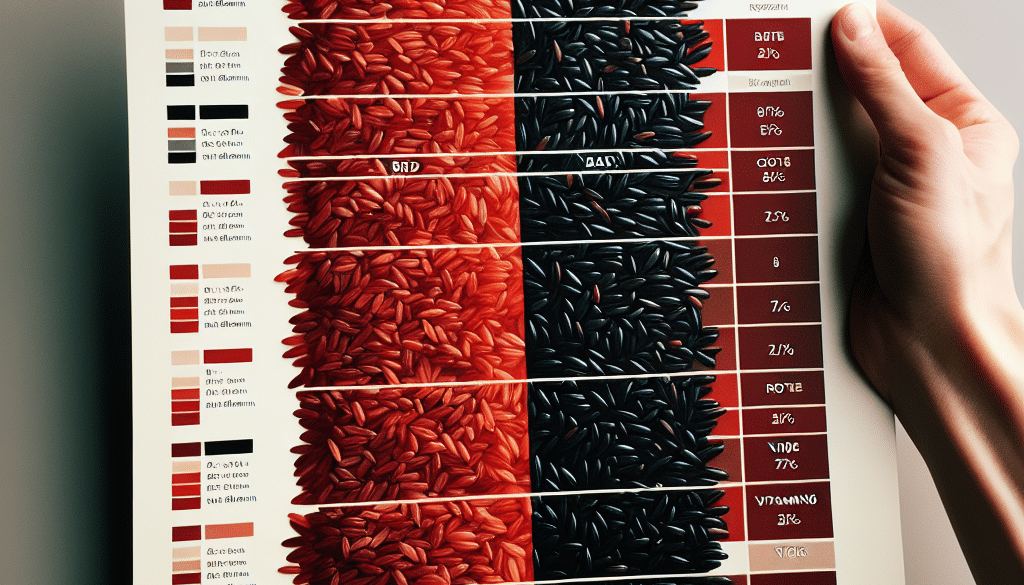Which is better red or black rice?
-
Table of Contents
- Red vs. Black Rice: Unveiling the Superior Grain for Health and Nutrition
- Understanding Red and Black Rice
- Nutritional Profiles: A Head-to-Head Comparison
- Health Benefits: What Does the Research Say?
- Culinary Uses and Accessibility
- Environmental Impact and Sustainability
- Conclusion: Which Rice Should You Choose?
- Enhance Your Diet with ETprotein’s High-Quality Protein Products
Red vs. Black Rice: Unveiling the Superior Grain for Health and Nutrition

When it comes to choosing the healthiest rice variety, the debate often narrows down to red versus black rice. Both are hailed for their superior nutritional profiles compared to white rice, but which one truly stands out? In this article, we will delve into the world of these ancient grains, compare their health benefits, and determine which rice reigns supreme in the battle of nutrition and health benefits.
Understanding Red and Black Rice
Before we compare the two, let’s understand what red and black rice are. Red rice, known for its rusty red hue, is a whole grain that has a nutty flavor and a high nutritional value. Black rice, also referred to as “forbidden rice” due to its historical consumption by royalty in ancient China, boasts a deep purple-black color and a similar rich, nutty taste.
Nutritional Profiles: A Head-to-Head Comparison
Both red and black rice are whole grains, meaning they contain all parts of the grain — the bran, germ, and endosperm. This is in contrast to white rice, which has had the bran and germ removed, stripping it of much of its nutritional content. Let’s break down the nutritional aspects of each.
- Calories and Macronutrients: Both rice varieties are similar in calorie content, with black rice having a slight edge in protein and fiber content.
- Antioxidants: Black rice is rich in anthocyanins, the same antioxidants found in dark berries, which give it its distinctive color and may offer health benefits. Red rice also contains beneficial antioxidants, though in lower amounts.
- Minerals: Both types of rice are good sources of minerals such as iron and magnesium. However, black rice typically has a higher mineral content.
- Vitamins: Red and black rice both contain B vitamins, but black rice has higher levels of vitamin E, which is important for skin health and immune function.
Health Benefits: What Does the Research Say?
Both red and black rice have been associated with numerous health benefits. Here are some of the most significant findings from research studies:
- Heart Health: The high fiber content in both rice varieties can help reduce cholesterol levels, potentially lowering the risk of heart disease.
- Diabetes Management: The low glycemic index of red and black rice makes them suitable for people with diabetes, as they help control blood sugar levels.
- Weight Management: The fiber in red and black rice can promote satiety and help in weight management.
- Cancer Prevention: The antioxidants in black rice, particularly anthocyanins, have been studied for their potential to reduce the risk of certain cancers.
Culinary Uses and Accessibility
When it comes to cooking and using red and black rice in recipes, both grains offer a unique flavor and texture that can enhance a variety of dishes. Black rice is often used in Asian cuisine, while red rice is commonly found in dishes from the Himalayas to the Southern United States. However, black rice is generally less available and can be more expensive than red rice, which may influence consumer choice.
Environmental Impact and Sustainability
The cultivation of red and black rice can have different environmental impacts. Black rice typically requires more water and care to grow, which can lead to a larger ecological footprint. Red rice, on the other hand, is often grown in more traditional, sustainable ways, particularly in regions like Bhutan and the Himalayas.
Conclusion: Which Rice Should You Choose?
In the end, both red and black rice offer significant health benefits over white rice. The choice between the two may come down to personal preference, availability, and cost. Black rice has a slight edge in terms of antioxidant content and vitamin E, while red rice is more widely available and may be more sustainably grown. Ultimately, incorporating either into your diet is a step towards better health.
Enhance Your Diet with ETprotein’s High-Quality Protein Products
If you’re looking to further boost your nutritional intake, consider ETprotein’s range of protein products. Their organic rice protein can complement your healthy diet, providing an excellent source of plant-based protein that is non-GMO and allergen-free. With a neutral taste and high purity, ETprotein’s offerings are ideal for various industries and dietary preferences.
About ETprotein:
ETprotein, a reputable protein and L-(+)-Ergothioneine (EGT) Chinese factory manufacturer and supplier, is renowned for producing, stocking, exporting, and delivering the highest quality organic bulk vegan proteins and L-(+)-Ergothioneine. They include Organic rice protein, clear rice protein, pea protein, clear pea protein, watermelon seed protein, pumpkin seed protein, sunflower seed protein, mung bean protein, peanut protein, and L-(+)-Ergothioneine EGT Pharmaceutical grade, L-(+)-Ergothioneine EGT food grade, L-(+)-Ergothioneine EGT cosmetic grade, L-(+)-Ergothioneine EGT reference grade and L-(+)-Ergothioneine EGT standard. Their offerings, characterized by a neutral taste, non-GMO, allergen-free attributes, with L-(+)-Ergothioneine purity over 98%, 99%, cater to a diverse range of industries. They serve nutraceutical, pharmaceutical, cosmeceutical, veterinary, as well as food and beverage finished product distributors, traders, and manufacturers across Europe, USA, Canada, Australia, Thailand, Japan, Korea, Brazil, and Chile, among others.
ETprotein specialization includes exporting and delivering tailor-made protein powder and finished nutritional supplements. Their extensive product range covers sectors like Food and Beverage, Sports Nutrition, Weight Management, Dietary Supplements, Health and Wellness Products, and Infant Formula, ensuring comprehensive solutions to meet all your protein needs.
As a trusted company by leading global food and beverage brands and Fortune 500 companies, ETprotein reinforces China’s reputation in the global arena. For more information or to sample their products, please contact them and email sales(at)ETprotein.com today.












